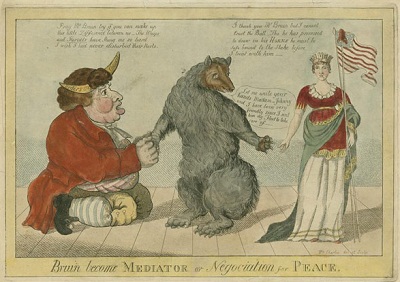Some Republicans expected the declaration of war against Great Britain to force concessions without spilling blood. Thus with the ink from the war’s declaration scarcely dry on the page, the Madison administration began initiating peace feelers immediately.
"The sword was scarcely out of the scabbard before the enemy was apprised of the reasonable terms on which it would be resheathed" President James Madison

Courtesy the Lilly Library, Indiana University, Bloomington
Congressional Republicans declared war against one of the world’s great powers without making adequate preparations. One Republican faction, known as “scarecrows,” expected that Great Britain, already ensnared in a major war with Napoleonic France, would quickly back down from an American declaration of war.
That strategy failed almost immediately. President Madison, his sword “scarcely out of the scabbard,” began hunting for a diplomatic way out of armed conflict. As early as June, 1812, an American diplomat in London proposed an armistice in return for Britain’s renunciation of impressment and the obnoxious Orders in Council.
But with the Orders already rescinded, the British would make no more concessions. “No administration,” declared Britain’s foreign secretary, “could expect to remain in power that should consent to renounce the right of impressment.”
Instead, the British gambled that once news of their repeal of the Orders in Council arrived in Washington, the Americans would likely end the war. But without a resolution on impressment, the Americans refused to budge. Even though both sides were drawn to peace, the first diplomatic overtures of the war ended in failure.
As Napoleon’s armies marched on Moscow, another opening came from Russian intermediaries in September, 1812. Russia’s Tsar Alexander desperately hoped that ending the war in North America would free British resources to fight Napoleon on the continent. Though the British ultimately rebuffed the Russian overture, President Madison had already dispatched a delegation to Russia, one that that included high-profile politicians Albert Gallatin and John Quincy Adams.
Even as the war raged on, both sides continued to jockey to secure peace on what they considered their own “reasonable terms.” Refusing to accept Russian mediation, the British countered by offering to initiate direct peace talks with their American adversaries. That proposal would eventually lead to diplomatic negotiations at Ghent.
Last updated: May 24, 2016
